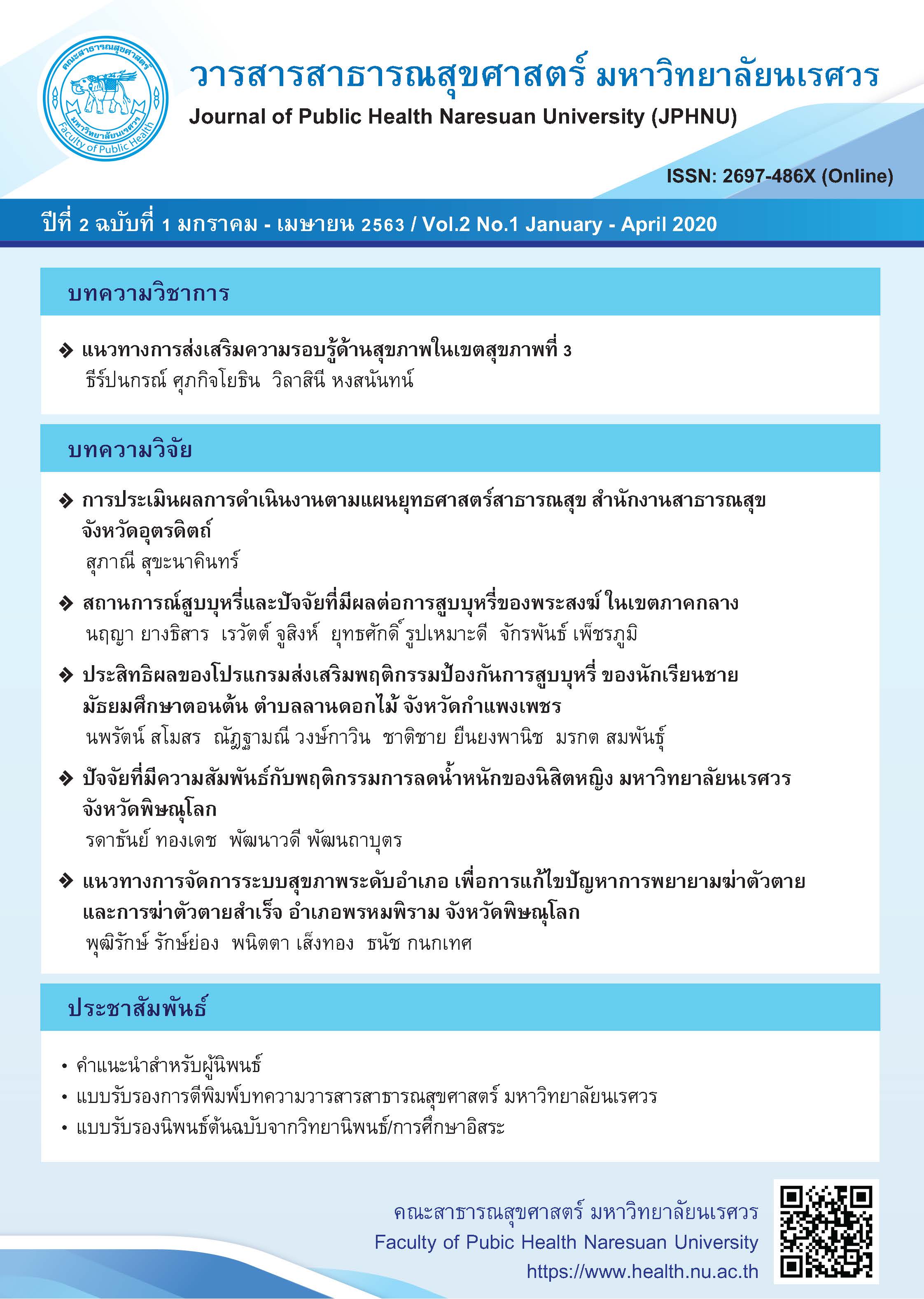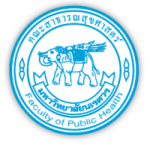Guidance for promoting health literacy in health region 3
Keywords:
Health promotion, Health literacy, Health behaviorAbstract
Health Literacy is the important priority of the World Health Organization (WHO). WHO has recommendation on the assessment of health literacy level of people in each countries in order to be use for the basis data of specific area for planning of promoting health literacy in consonant with all dimensions of health literacy to improve health behavior of people. This article aims to focus on recommendation about promoting health literacy in health region 3, including the definition of health literacy, levels of health literacy, the assessment tools of health literacy, the situation of health literacy in Thailand and health region 3 and guidance for promoting health literacy of people in health region 3 to enhance their health literacy in the future.
References
Davis, T. C., Long, S. W., Jackson, R. H., Mayeaux, E. J., George, R. B., Murphy, P. W. et al. (1993). Rapid estimate of adult literacy in medicine: A shortened screening instrument. Family Medicine, 25(6), 391-395.
Department of Health. (2020). Target of Office of DOH 4.0 and health literacy. Retrieved February 14, 2020, from http://dohhl. anamai.moph.go.th/main.php?filename=goal. (in Thai)
Department of Health. (2019). Health literacy status of Thailand in 2019. Retrieved February 14, 2020, from http://dohhl.anamai.moph.go.th/download/20200102- สถานการณ์ความรอบรู้ด้านสุขภาพของคนไทย_2562.pdf. (in Thai)
Doustmohammadian, A., Omidvar, N., Keshavarz-Mohammadi, N., Abdollahi, M., Amini, M., & Eini-Zinab, H. (2017). Developing and validating a scale to measure Food and Nutrition Literacy (FNLIT) in elementaryschool children in Iran. PLoS One, 12(6), e0179196. doi:10.1371/journal.pone.0179196.
Ghanbari, S., Ramezankhani, A., Montazeri, A., & Mehrabi, Y. (2016). Health Literacy Measure for Adolescents (HELMA): Development and psychometric properties. PLoS One, 11(2), e0149202. doi:10.1371/journal.pone.0149202.
Han, H. R., Huh, B., Kim, M. T., Kim, J., & Nguyen, T. (2014). Development and validation of the assessment of health literacy in breast and cervical cancer screening. Journal of Health Communication, 19 Suppl 2(0 2), 267-284.
Health Education Division. (2014). The health literacy scale for Thai adults. Bangkok: New Thammada. (in Thai)
Health Education Division. (2016). Promoting and accessing health literacy and health behavior. Bangkok: Department of Health. (in Thai)
Health Education Division. (2018). Health literacy and health behavior 2561. Nonthaburi: Department of Health Service Support. (in Thai)
Health Education Division. (2020). Tool and guildline for health literacy assessment. Retrieved February 14, 2020, from http://www. hed.go.th/linkHed/index/369. (in Thai)
Intarakamhang, U. (2017). Health literacy meausurement and developement. Bangkok: Sukhumvit printing. (in Thai)
Kaeodumkoeng, K. (2013). Health literacy. Nonthaburi: Health Education Division. (in Thai)
Kaeodumkoeng, K. (2018). Health lteracy access, understand and application. Nonthaburi: Amarin Book. (in Thai)
Leung, A. Y., Lou, V. W., Cheung, M. K., Chan, S. S., & Chi, I. (2013). Development and validation of Chinese Health literacy Scale for Diabetes. Journal of Clinical Nursing, 22(15-16), 2090-2099.
Nutbeam, D. (2000). Health literacy as a public health goal: A challenge for contemporary health education and communication strategies into the 21st century. Health Promotion International, 15(3), 259-267.
Nutbeam, D. (2008). The evolving concept of health literacy. Social Science & Medicine, 67(12), 2072-2078.
Nutbeam, D. (2009). Defining and measuring health literacy: What can we learn from literacy studies? International Journal of Public Health, 54(5), 303-305.
Office of DOH 4.0 and Health Literacy. (2017). Health Literacy. Retrieved February 14, 2020, from http://dohhl.anamai.moph.go.th/main.php?filename=index. (in Thai)
Osborne, R. H., Batterham, R. W., Elsworth, G. R., Hawkins, M., & Buchbinder, R. (2013). The grounded psychometric development and initial validation of the Health Literacy Questionnaire (HLQ). BMC Public Health, 13(1), 658. doi:10.1186/1471-2458-13-658.
Parker, R. M., Baker, D. W., Williams, M. V., & Nurss, J. R. (1995). The test of functional health literacy in adults: A new instrument for measuring patients’ literacy skills. Journal of General Internal Medicine, 10(10), 537-541.
Pleasant, A. (2013). Health literacy around the world: Part 1 health literacy efforts outside of the United States. Retrieved February 14, 2020, from https://www.ncbi.nlm.nih.gov/books/NBK202445/
Region Health Service Support 3. (2019). Health literacy report (Health Region 3) 2019. Nakhonsawan: Region Health Service Support 3, Department of Health Service Support. (in Thai)
Region Health Service Support 3. (2020). Plan policy. Retrieved February 14, 2020, from http://do3.new.hss.moph.go.th:18080/index.php?form=6. (in Thai)
Roma, W. (2019). Health literacy and health communication 2019. Retrieved February 14, 2020, from http://foodsan.anamai.moph.go.th/download/D_HLO/Health%20Literacy%20&%20Health%20Communication.pdf. (in Thai)
Samruayruen, K., & Kitreerawutiwong, N. (2018). Understanding on assessing health literacy. EAU Heritage Journal Science and Technology, 12(3), 1-13. (in Thai)
Sheridan, S. L., Halpern, D. J., Viera, A. J., Berkman, N. D., Donahue, K. E., & Crotty, K. (2011). Interventions for individuals with low health literacy: A systematic review. Journal of Health Communication, 16(Suppl 3), 30-54.
World Health Organization. (1998). Health promotion glossary. Geneva: WHO Publications.
World Health Organization. (2020). Health literacy and health behaviour. Retrieved February 14, 2020, from https://www.who.int/healthpromotion/conferences/7gchp/track2/en/.
Downloads
Published
How to Cite
Issue
Section
License
Copyright (c) 2020 Journal of Public Health Naresuan University

This work is licensed under a Creative Commons Attribution-NonCommercial-NoDerivatives 4.0 International License.
The published article is copyrighted by the Journal of Public Health and Health Sciences Research.
The statements that appear in each article in this academic and research journal are the personal opinions of each author and are not related to Naresuan University and other faculty members in the university. Responsibilities regarding each article are the responsibility of each author.






